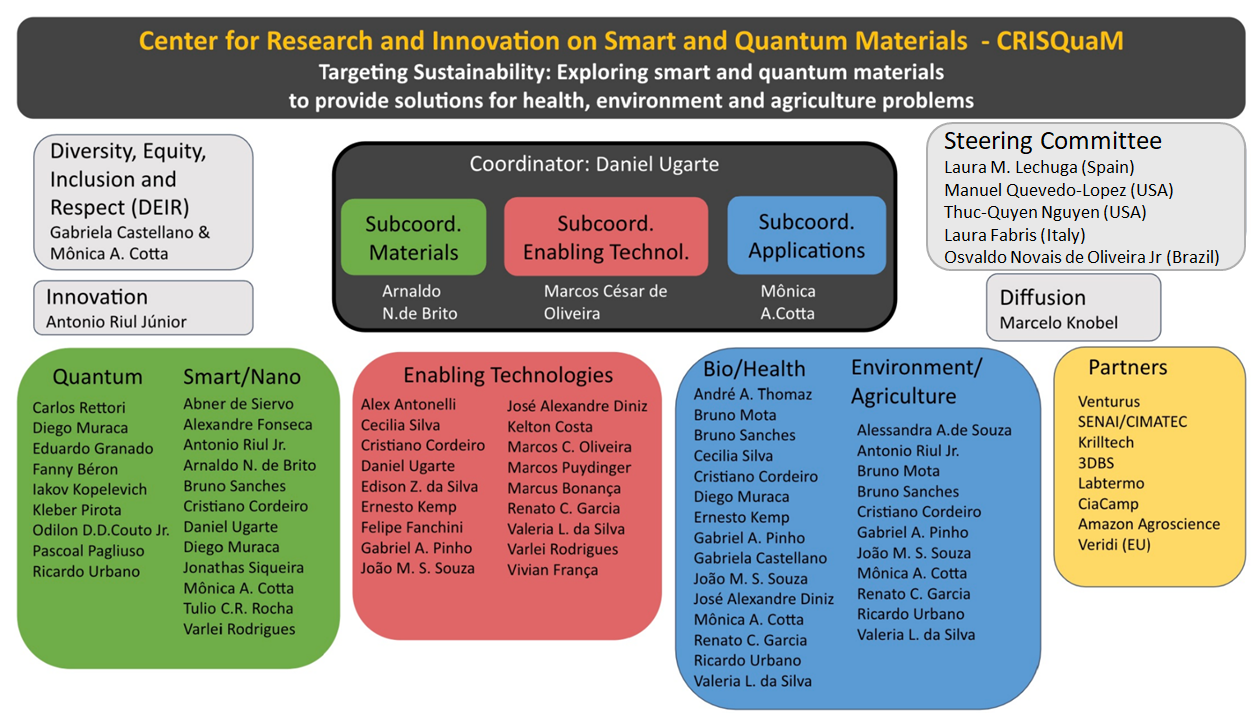BV-FAPESP: research projects supported in this Center
CRISQuaM in the Media: news about the center
CRISQuaM aims to explore the synergistic development of fundamental and applied science to create new materials with high potential for the construction of devices and sensors to address technological challenges related to sustainability, climate change, precision agriculture, ecology, and health. To achieve these goals, we have assembled an interdisciplinary and collaborative research team, integrating expertise across various scientific domains, researching novel materials with high innovation potential. By combining original synthesis methods, advanced characterization techniques, theoretical approaches, computational simulations, quantum technologies, and device construction designs, we aim to drive advances in smart and quantum materials, promoting scientific excellence and technological development. With this, we plan disruptive innovations in instrumentation—including hardware and AI-based tools—as well as in quantum technologies, biomedical devices, and signal processing, in addition to plant bionics, exploring plant-pathogen interactions. Besides research activities, we plan intensive actions in education, dissemination, and communication for the general public, as a modern society should be aware of the challenges humanity faces and how research and technology are essential for responsibly utilizing the planet's limited resources. CRISQuaM's Innovation activities are accelerated through partnerships with several companies in related technologies, many of them Brazilian. Finally, all activities of the Center are managed in accordance with diversity, equity, and inclusion goals and best practices.
The Center brings together scientists, engineers, and innovators in a collaborative effort to apply materials science and quantum technologies at the cutting edge, designing new materials and nano(bio)sensors for advanced diagnostics. The Center has a team capable of producing a wide range of (nano/micro) materials, along with precise chemical and physical characterizations using modern techniques (synchrotron, advanced microscopy, magnetotransport, magnetic resonance, optics, etc.). In addition, the team offers various options in enabling technologies, including miniaturization, processing, and additive manufacturing, as well as instrumentation, quantum sensing, and electronics development. Data analysis will employ updated approaches (numerical simulation, classical and quantum machine learning, and quantum optimization). Applications at the knowledge frontier will address urgent sustainability needs in environmental areas, precision agriculture, plant bionics, and biomedical interfaces, contributing to the development of local technologies in close partnership with the Brazilian industry.
The organization of the Center is based on three pillars — Materials, Enabling Technologies, and Applications — together with partner companies, as described in the figure below.

2024-02-14
Blood pressure rose in offspring born to high-fructose rats, and physiological regulation of their cardiovascular system was impaired. High-fructose syrup is widely used as a sweetener by the food and beverage industry.
2024-02-09
A study by Brazilian researchers shows that the pigment is present not only in the seeds but also in other organs of Bixa orellana, the Annatto tree. They investigated the genetic pathways involved in synthesis of the substance.
2024-02-07
A study led by Brazilian researchers suggests that the mechanism that exacerbates dengue infection following a case of zika differs from that acting on second-time dengue patients. The finding is relevant to the development of a zika vaccine.
2024-02-07
A study conducted at a FAPESP-supported research center discovered a link between the protein VAPB and tumor cell proliferation in medulloblastoma, one of the most common and aggressive brain tumors in children.
2024-02-07
Considered an invasive species, Sus scrofa causes damage to farmers in an important part of Brazil’s savanna-like biome. The researchers analyzed 55 landscapes in São Paulo state, observing larger numbers of native mammals in areas with well-conserved vegetation and diversified crops, while native species richness was far lower in areas of monoculture.
2024-02-07
With the new contributions from abroad, the Scientific Expeditions call, issued in partnership with the National Council for Scientific and Technological Development, now has a fund totaling some BRL 94 million.
2024-02-07
CD4+ T cells play an important role in the immune response to pulmonary infections, but excessive amounts can damage the lungs. In experiments with mice, researchers at the University of São Paulo discovered what leads to this exacerbated response.
2024-02-07
The startup has been supported by FAPESP since its foundation in 2020. The device can be used to make film for perovskite solar cells, biomaterials for wound dressings and tissue regeneration, and novel drug and cosmetic delivery systems.